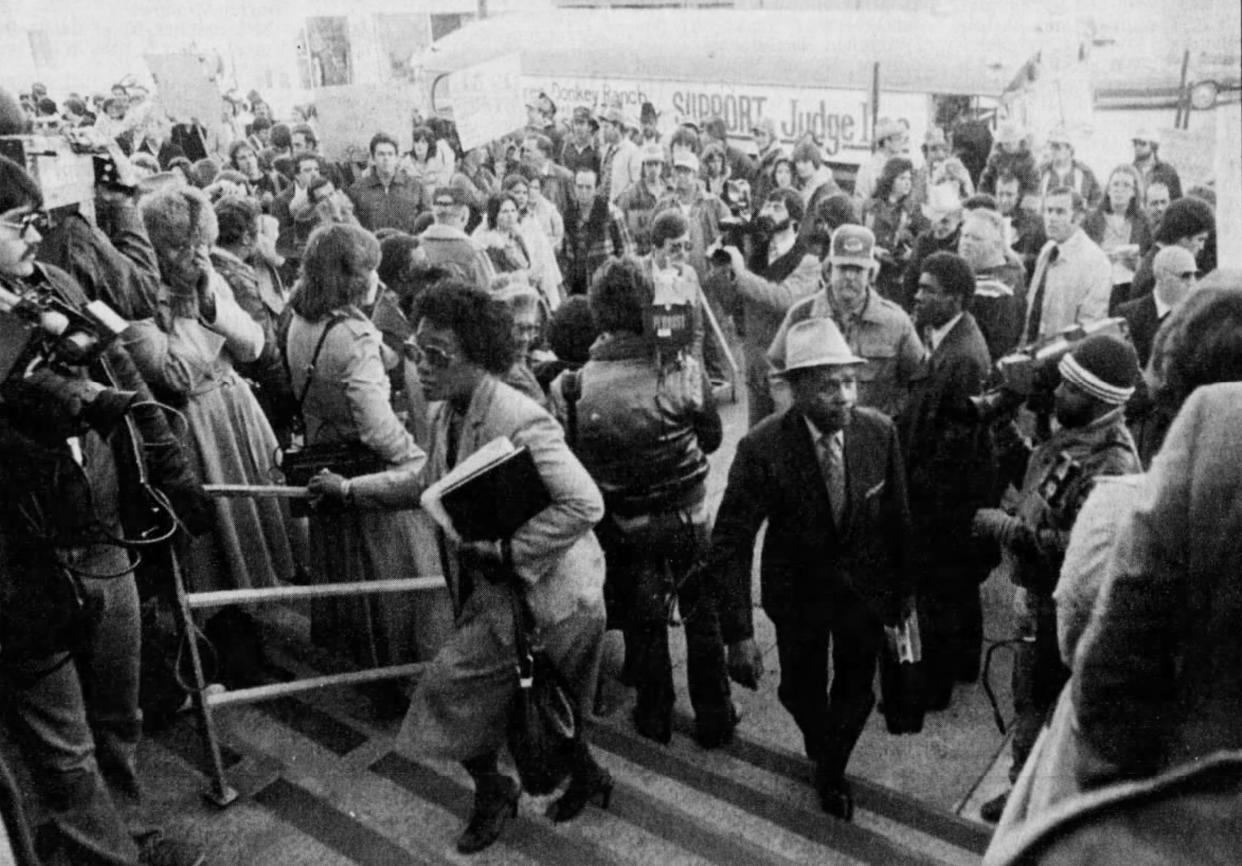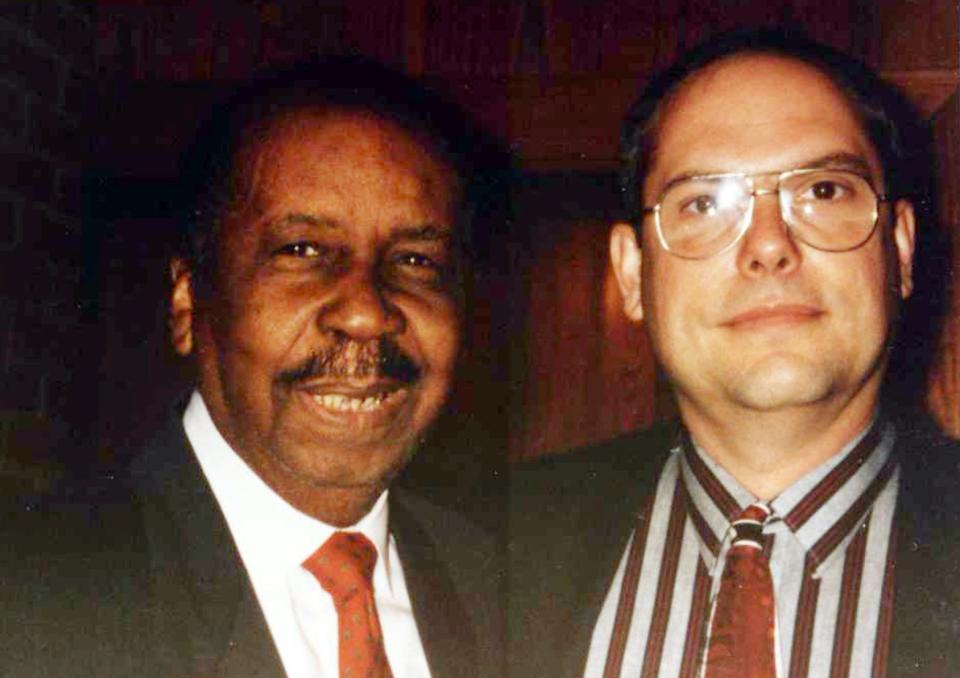Alexandria attorney changed course of Civil Rights in Louisiana

- Oops!Something went wrong.Please try again later.
Editor’s note: This is the last in a four-part series.
In honor of Black History Month, local historian and author Micheal Wynne spoke to the City of Alexandria Rotary Club about four Black local historical figures who were instrumental in building and shaping Alexandria and Pineville. The four he spoke about were August J. Toussaint, Charles Frederick Page, John Baptiste LaFargue and Louis Berry.
Black history, Wynne told the Rotarians, is everyone’s history.
“I got interested in our area's African-American history when I began actively researching local history a couple decades ago,” Wynne said in an email. “I found almost nothing written in all of our local history books or on display in local historical museums about African-American history in Central Louisiana. It was like their history was purposely left out. This shocked me as at least 1/3 of our population is African American.”
Louis Berry
“A person more recent, some of you all may remember very well,” Wynne told the Rotarians about the prominent attorney Louis Berry.
“Berry almost single-handedly changed the course of Civil Rights in Louisiana. We would be a decade or two farther back in Jim Crow's times even it wasn't for Louis Berry,” Wynne stated in an email.
In his talk to Rotarians, Wynne described Berry, who died in 1998, as a fascinating character. Wynne nominated was the chairman of the Louisiana Political Hall of Fame when he nominated and inducted Berry in 1996.

“His father ran a bootleg liquor operation for the chief of police here in Alexandria in the 1920s,” Wynne said. “When he saw his father constantly getting in trouble, he realized he needed to get in the field of law to possibly protect his own father.”
Berry’s father sent his three children to college, which Wynne said was usually back in those days.
“He sent one to law school, Louis. One to medical school and one to business,” Wynne said. “And according to Bridget Brown who was Louis’ legal partner, Louis’ father wanted to run the city of Alexandria through his children.”
Berry attended Howard University and UCLA law school.
“At Howard, Louis studied under future U.S. Supreme Court Justice Thurgood Marshall,” Wynne said.
Berry got his first taste of Civil Rights activism at Howard University.
“He was the leader of a group of freshmen, who in 1934, staged a sit-in at the U.S. Senate restaurant because they would not serve Black people,” Wynne said.
Berry was the first Black lawyer in Alexandria and the second registered Black lawyer in the state.
“In 1947, Louis filed suit against the City of Alexandria for closing the all Black Casson Street Community Center and then not allowing Blacks to enter the Alexandria Community Center on Bolton Avenue,” Wynne said. “He mostly won the suit. They wouldn’t allow Blacks into the Alexandria Community Center, but they reopened the Casson Street Community Center.”
In 1965, Wynne said, “Berry represented Vergie Vallery, a 15-year-old Black girl, and seven other families with 23 children, against the Rapides Parish School Board regarding desegregation of the schools. His suit resulted in radically altering the parish school system, making it what it looks like today. Thanks to Louis Berry. And he did the same thing for the public schools Natchitoches and Avoyelles Parishes.”
Berry’s personal suits also resulted in the integration of the LSU law, medical, and dental schools, Wynne said.
“Mayor Ernest 'Dutch' Morial was the first black graduate of the LSU Law School and he gave full credit to Louis Berry in making this happen,” he said.
He also filed suit against LSU for not allowing Black and white athletes to play ball together.
“And he integrated the sports teams at LSU,” he said.
Berry also filed another lawsuit stating that Black students needed their own law school and that resulted in the creation of Southern University Law School.
“And as thanks, the Ku Klux Klan burned a cross across the street from Berry's office on Ninth Street in the late 1960's,” Wynne said.
He also said that Berry predicted in the 1990s to Brown, and others, “that a Black man would one day become the federal judge here in Alexandria. African-American Jerry Edwards was appointed to the Federal Judgeship here in the Western District this past December.”
“Louis, and this is the sad part. Louis is buried at Holly Oak Cemetery, an abandoned cemetery,” Wynne said. “The cemetery is overgrown, and you can’t even walk to his grave.”
Wynne said he planned to go out to Holly Oak and clean Berry’s grave.
Wynne said he especially enjoys “doing research on African-American subjects as I am breaking new ground every day in this area. And what I have found so far is absolutely fascinating. But there is still so much more to research.”
“There is a great need to preserve African American history, more than ever. So much has been lost due to neglect as well as willful destruction by haters. It is all of our jobs, our responsibility to save all of our history, not just of our own race or gender or creed,” Wynne stated in his email. “If we ourselves want and hope for respect, we must offer respect to others of different origins. Much of our history is not only lost due to neglect, but even worse due to ignorance. History of different levels of importance happens every day. As has been said many times, ‘Those who cannot remember the past are condemned to repeat it.’ (from George Santayanna)”
This article originally appeared on Alexandria Town Talk: Alexandria attorney changed course of Civil Rights in Louisiana

